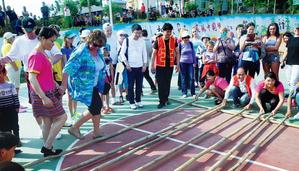Green tourism has provided new hope for residents, Ma Zhiping reports in Qiongzhong, Hainan province.
 Qiandui village on Hainan Island is surrounded by water every year during the rainy season. (CHEN YUANCAI / FOR CHINA DAILY)
Qiandui village on Hainan Island is surrounded by water every year during the rainy season. (CHEN YUANCAI / FOR CHINA DAILY)
Members of the Li ethnic group of Qiandui in Hainan province love to call their village "a grassland in spring and summer and a sea in autumn and winter". It is a vivid expression that encapsulates the local beauty as the seasons change.
With mountains on three sides, and the upper branches of the Wanquan River on the fourth, fields in front of Qiandui village in Qiongzhong, center of the tropical island, become a "grassland" when villagers grow vegetables, maize, peanuts and rice, as the dry season starts in spring and summer. The fields, more than 133 hectares in area, turn into a "sea", when rainfall, as much as 200 millimeters on average, swells the rivers in autumn and winter.
The villagers led a humble life for a long time, because of limited farmland, lack of transportation and their simple means of production, says 40-year-old Hu Kaijun, an official with the village committee and head of a tourism cooperative.
In 2014, about 40 percent of Qiandui's 1,121 residents were poverty-stricken, with a per capita annual income of 3,800 yuan (US$577), says Hu, who runs a three-floor homestay, the largest and most eye-catching one in Qiandui.
"The natural wonders are producing greater economic benefits for the locals thanks to the development of ecotourism in the past several years," says Hu.
On the third floor of Hu's homestay house, a spacious terrace unfolds as visitors can enjoy a panoramic view of rows of bright red-roofed houses lined with coconut and betel nut trees and vast water areas lined with vibrant mountains.
 A local fisherman heads back home. (LI XINGHUANG / FOR CHINA DAILY)
A local fisherman heads back home. (LI XINGHUANG / FOR CHINA DAILY)
Fu Yuzhi, a head official of Qiandui, says the life of the villagers began to improve in 2015, when the provincial government and the Qiongzhong county authorities launched supporting programs and provided 30 million yuan of funds to build roads and bridges, and supply natural gas and 4G telecommunication networks that would link the village with the outside world.
"Better communication with the outside world has also provoked new ideas for development among the locals. We tapped the fine ecological resources and environment as an advantage to develop tourism, encourage the farmers to raise chicken, geese and black sheep, farm fish and shrimp, open small household restaurants with Li-style foods to feed visitors while continuing the traditional growing of betel nut and rubber trees," says Fu.
He says the local government provided free poultry seedlings to the poorer families, and arranged about 200 night-school training classes to teach the local people farming and poultry cultivation techniques in the past four years.
Chen Shuwen and Ou Yujiao, a couple who were not able to afford school fees for their two children several years ago, have become well-off and are leaders in raising wild pheasants. They earned 300,000 yuan last year and have organized a cooperative for 34 of the once poverty-stricken households, leading them out of poverty.
"I have never imagined that happiness comes so quickly. We eat better food and wear better clothes and we are all very grateful for what the support teams sent by the local governments have done for us," says Chen Fenglian, a Li woman and mother of three children.
Though an ordinary farmer, she has a busy schedule every day. She runs a five-room homestay, serving occasionally as a guide for tourists, grows betel nut trees on a piece of land that is about 2.7 hectares in size with her husband and picks herbal plants in the mountains to make a special tea that sells well online.
"Selling things online gives me a sense of accomplishment," says Chen, who is also an active member of the village choir. She says they practice often and perform for visitors on holidays.
"We enjoyed the cultural exchanges with foreign tourists, especially. We sing Li folk songs to Russian tourists and they sing songs of their own to us. Though we don't understand the exact meaning of the songs, the feeling of getting close to a different group of people is good enough," says Chen.
"The most remarkable change in Qiandui was that most of the villagers have come to understand that happiness could only be harvested through hard work," says Fu.
 Foreign tourists enjoy traditional bamboo dancing in the village. (CHEN SISI / FOR CHINA DAILY)
Foreign tourists enjoy traditional bamboo dancing in the village. (CHEN SISI / FOR CHINA DAILY)
He says abundant ecological resources have attracted investors. Some investors from Fujian province and Hong Kong, for instance, have visited the place and shown a strong interest to develop healthcare projects in nearby areas.
With its germ-killing negative oxygen ions reaching as high as between 20,000 and 30,000 per square cubic centimeter, 20 times more than those in the big cities, Qiandui and its nearby villages in Qiongzhong are expected to become ideal places for leisure and recuperation.
"I like to drink the tea that smells of fragrant herbal medicine, enjoy seeing the manner the Li women villagers brew tea, seeing their bright eyes and hearing their hearty laughter," Luo Ling, a netizen, writes in her travel weblog.
"Everything here makes you feel safe, sound and at peace. The change of seasons means a different beautiful scenery. Every element in Qiandui village is an image of beauty," Luo adds.
The per capita net income of villagers increased to 14,077 yuan in 2019, up 3.7 times in six years, and the total number of tourists received was nearly 35,000. Among them, about 4,000 tourists came from Russia.
Honors have also followed as the village makes continuous progress, such as "national ecological cultural village", "national forest village "and "provincial science and technology demonstration village".
Fu, the village leader, says the local leadership will further improve Qiandui's tourism facilities, develop more tourism business forms to turn the whole village into a model and bench mark of international rural tourism resort in Hainan.
Contact the writer at mazhiping@chinadaily.com.cn


